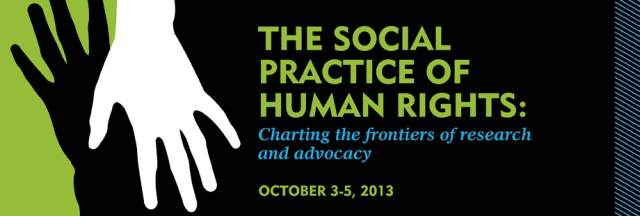Vertical Voices and Rationalized Rights: The Problem of Transnational Networks in the International Disability Rights Movement
Location
River Campus - Room M2005
Start Date
10-4-2013 3:15 PM
Abstract
The passage of the UN Convention on the Rights of Persons with Disabilities in 2006 was hailed by the international disability rights movement as “giving voice” to millions of persons with disabilities around the world. The Convention is unique because it includes specific articles obligating States Parties to “partner with civil society, in particular organizations of persons with disabilities” in international cooperation and rights monitoring and evaluation. No prior human rights instrument has specified the rights bearers themselves as integral to the implementation of the treaty.
Leaders throughout the international disability rights community, however, are making contradictory claims under the rubric of voice. First, they are calling for grassroots associations representing diverse populations of persons with disabilities to participate in the public sphere. But they are also calling for their voices to be unified. In short, they want heterogeneity amongst the participants, but homogeneity in what they say. The result has been the establishment of hierarchical networks of disability organizations that begin at the local level and build up to a single, international alliance.
Beginning with grassroots associations in one province of Nicaragua, I show that the specific concerns of persons with disabilities are silenced as they attempt to communicate them up through a departmental coalition, a national network, and eventually an international alliance. Rather than acting as channels for participation, the networks only act as a legitimating veneer for elites to articulate their pre-established notions regarding what people with disabilities need worldwide or influence advocates on the ground.
Vertical Voices and Rationalized Rights: The Problem of Transnational Networks in the International Disability Rights Movement
River Campus - Room M2005
The passage of the UN Convention on the Rights of Persons with Disabilities in 2006 was hailed by the international disability rights movement as “giving voice” to millions of persons with disabilities around the world. The Convention is unique because it includes specific articles obligating States Parties to “partner with civil society, in particular organizations of persons with disabilities” in international cooperation and rights monitoring and evaluation. No prior human rights instrument has specified the rights bearers themselves as integral to the implementation of the treaty.
Leaders throughout the international disability rights community, however, are making contradictory claims under the rubric of voice. First, they are calling for grassroots associations representing diverse populations of persons with disabilities to participate in the public sphere. But they are also calling for their voices to be unified. In short, they want heterogeneity amongst the participants, but homogeneity in what they say. The result has been the establishment of hierarchical networks of disability organizations that begin at the local level and build up to a single, international alliance.
Beginning with grassroots associations in one province of Nicaragua, I show that the specific concerns of persons with disabilities are silenced as they attempt to communicate them up through a departmental coalition, a national network, and eventually an international alliance. Rather than acting as channels for participation, the networks only act as a legitimating veneer for elites to articulate their pre-established notions regarding what people with disabilities need worldwide or influence advocates on the ground.




Comments
This biennial conference provides a unique space for scholars, practitioners and advocates to engage in collaboration, dialogue and critical analysis of human rights advocacy — locally and globally. Learn more about the Human Rights Center at the University of Dayton >>>.